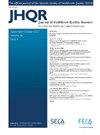Comparison and analysis of biological drug consumption in two Italian hospital settings: Governance actions and prescribing appropriateness
IF 1
Q4 HEALTH CARE SCIENCES & SERVICES
引用次数: 0
Abstract
Background
Biosimilar drugs represent a valuable opportunity for healthcare systems worldwide, offering substantial cost savings while ensuring equivalent efficacy and safety in treating chronic conditions. These savings can be reinvested in ongoing medical innovation.
Methods
An investigation was carried out to evaluate the utilization of key biologic therapies across various clinical indications within two Italian healthcare institutions: Asl Napoli 3 Sud and Policlinico Umberto I in Rome. Information regarding consumption and expenditure was extracted from institutional databases. A comparison with figures from 2021 was conducted to detect any growth in biosimilar adoption throughout 2022.
Results
The 2022 review demonstrated that most of the examined compounds were administered predominantly as biosimilars, with proportions nearing complete substitution, aside from some notable outliers. In particular, reluctance persisted in prescribing biosimilar adalimumab (73.8%) and etanercept (73.3%) at Asl Napoli 3 Sud, as well as erythropoietin (69.5%) and rituximab (72.8%) at Policlinico Umberto I.
Conclusion
The year-on-year comparison between 2021 and 2022 underscored a growing shift toward biosimilar prescriptions. This favorable direction indicates the likelihood of reaching full implementation soon, with meaningful advantages for the National Healthcare Service and citizens, promoting an efficient and economically viable model of care.
比较和分析两家意大利医院的生物药物消费:治理行动和处方适当性
生物仿制药为全球医疗保健系统提供了一个宝贵的机会,在确保治疗慢性疾病的同等功效和安全性的同时,提供了大量的成本节约。这些节省下来的资金可以再投资于正在进行的医疗创新。方法开展一项调查,评估两家意大利医疗机构(那不勒斯3 Sud医院和罗马Umberto I医院)在各种临床适应症中关键生物疗法的使用情况。有关消费和支出的资料摘自机构数据库。与2021年的数据进行比较,以检测整个2022年生物仿制药采用的增长情况。结果2022年的审查表明,除了一些显著的异常值外,大多数被检查的化合物主要作为生物类似药给药,比例接近完全替代。特别是,在Asl Napoli 3 Sud,不愿开生物仿制药阿达木单抗(73.8%)和依那西普(73.3%),以及在Policlinico Umberto i,不愿开促红细胞生成素(69.5%)和利妥昔单抗(72.8%)。结论2021年和2022年的同比比较表明,越来越多的人转向开生物仿制药。这一有利的方向表明,很快就有可能全面实施,对国家医疗保健服务和公民有意义的好处,促进一种高效和经济上可行的护理模式。
本文章由计算机程序翻译,如有差异,请以英文原文为准。
求助全文
约1分钟内获得全文
求助全文
来源期刊

Journal of Healthcare Quality Research
Medicine-Health Policy
CiteScore
1.70
自引率
8.30%
发文量
83
审稿时长
57 days
期刊介绍:
Revista de Calidad Asistencial (Quality Healthcare) (RCA) is the official Journal of the Spanish Society of Quality Healthcare (Sociedad Española de Calidad Asistencial) (SECA) and is a tool for the dissemination of knowledge and reflection for the quality management of health services in Primary Care, as well as in Hospitals. It publishes articles associated with any aspect of research in the field of public health and health administration, including health education, epidemiology, medical statistics, health information, health economics, quality management, and health policies. The Journal publishes 6 issues, exclusively in electronic format. The Journal publishes, in Spanish, Original works, Special and Review Articles, as well as other sections. Articles are subjected to a rigorous, double blind, review process (peer review)
 求助内容:
求助内容: 应助结果提醒方式:
应助结果提醒方式:


